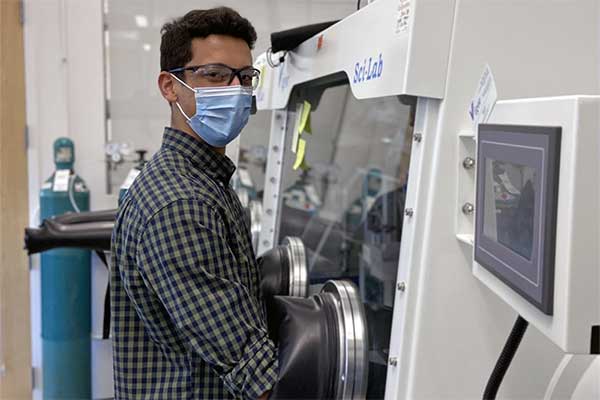Chemical Engineering Master’s Student Works Toward Better Electric Vehicles with Battery Materials on Co-op

As electric vehicles become more prominent, accessible, and convenient, it is imperative that research continues to push the reliability of their batteries further.
That’s what Haroon Bukhari, a chemical engineering master’s student, who is originally from Bedford, Massachusetts, explores each day as an employee on co-op. Bukhari learns on the job at Rogers Corporation on Northeastern’s Innovation campus in Burlington, Massachusetts. He conducts polymeric materials research for EV application with Rogers Corporation. His research focuses on how changing formulations or physical properties affects heat conduction.
“Designing reliable polymers that can transfer heat efficiently makes it possible for industries using those technologies to thrive,” Bukhari said. “My hope is that new developments in the engineering of these materials will improve electric vehicle performance and safety at a time when alternatives to fossil-fuel guzzlers are sorely needed.”
Batteries produce a lot of heat. Bukhari’s research explores different methods to protect battery cells from heat with wrapping materials.
Bukhari said he never expected to find himself researching this topic, but he greatly enjoys the work. The highlight of his time at Rogers Corporation has been working alongside the company’s researchers.
“You know the work is fun when you look at the clock at the end of the day and realize you’ve been working overtime,” Bukhari said. “Every month has brought something new.”
Bukhari’s interest in chemical engineering started in high school and continued with his undergraduate studies at the University of California-Berkeley. But as a sophomore in undergrad, Bukhari struggled. He started the process of switching majors, but missed the deadline to change his course of study.
As he continued his studies, the semesters recharged his interest in chemical engineering. He began enjoying chemical engineering again while doing research on semiconductor materials. Things only got better when he joined Northeastern’s chemical engineering program.
“Discovering these trends in thermal properties is the first step to making them better,” Bukhari said. “Already, we’ve found interesting avenues to take for future projects so if all goes well, we potentially have a new product line on the way.”